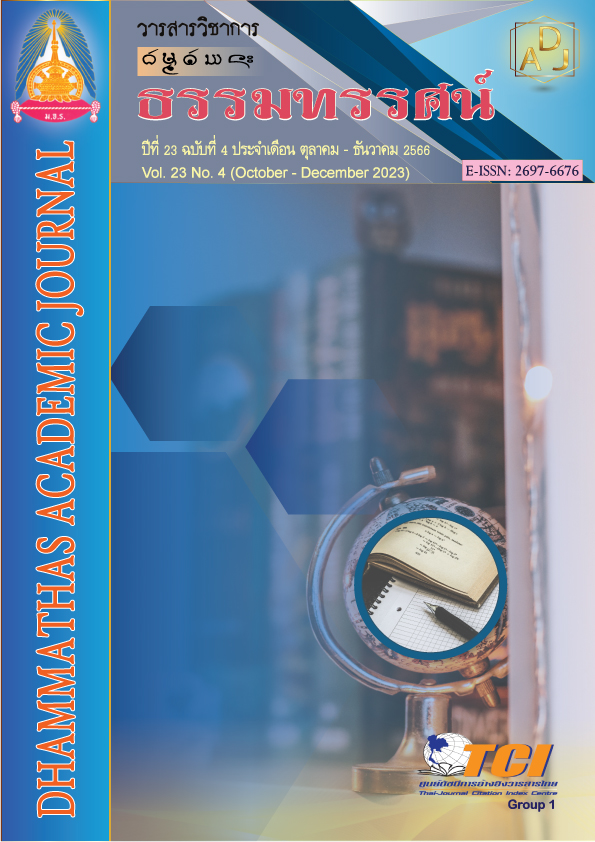The Participatory Process in the Inheritance and Organizing of Cultural Activities within the urban area: A Case study of the Sala Lhang Ban, Bangkok
Main Article Content
Abstract
The objective of this research was to investigate; 1) study the roles of stakeholders involved in participating in the continuation process and organizing activities within urban areas, 2) stakeholder participation process model through the concept of New Public Governance by qualitative research and collecting participant observation data including in-depth interviews. In selecting interviewees by a purposive selection, groups of key informants’ total number are 15 people: the government sector, community, network of community groups, education sector and the private sector.
The major findings revealed as follows:
1. Roles of stakeholder’s involved in the process of participating in driving cultural activities, consisting of 1) government agencies drive guidelines and plan activities. 2) People in the community participate in thinking, making decisions, and implementing activities. 3) The Bang Phrom Sub-district Community Network, Taling Chan District, acts similarly to the people in the community. 4) The educational sector jointly suggests activities and support manpower resources, and 5) the private sector support resources and suggest guidelines for carrying out activities.
2. There are 4 steps in the process of participation in relevant network partners: 1) decision-making process government, 2) implementation of activities, 3) use of resources within the area, 4) the creation of an ecosystem. These forms will be applied to future cultural activities to ensure clarity and sustainability.
Article Details

This work is licensed under a Creative Commons Attribution-NonCommercial-NoDerivatives 4.0 International License.
เพื่อให้เป็นไปตามกฎหมายลิขสิทธิ์ ผู้นิพนธ์ทุกท่านต้องลงลายมือชื่อในแบบฟอร์มใบมอบลิขสิทธิ์บทความ ให้แก่วารสารฯ พร้อมกับบทความต้นฉบับที่ได้แก้ไขครั้งสุดท้าย นอกจากนี้ ผู้นิพนธ์ทุกท่านต้องยืนยันว่าบทความ ต้นฉบับที่ส่งมาตีพิมพ์นั้น ได้ส่งมาตีพิมพ์เฉพาะในวารสาร วิชาการธรรม ทรรศน์ เพียงแห่งเดียวเท่านั้น หากมีการใช้ ภาพหรือตารางของผู้นิพนธ์อื่นที่ปรากฏในสิ่งตีพิมพ์อื่นมาแล้ว ผู้นิพนธ์ต้องขออนุญาตเจ้าของลิขสิทธิ์ก่อน พร้อมทั้ง แสดงหนังสือที่ได้รับการยินยอมต่อบรรณาธิการ ก่อนที่บทความจะได้รับการตีพิมพ์References
จักรสิน น้อยไร่ภูมิ. (2551). แนวคิดชุมชนเมืองที่พอเพียง: การออกแบบชุมชนเมืองที่ยั่งยืนในรูปแบบของไทย. NAJUA: Architecture, Design and Built Environment, 23, 177-177.
ธีรยุทธิ์ เบ็ญล่าเต๊ะ และสถาพร มงคลศรีสวัสดิ์. (2554). การนำกระบวนการบริหารจัดการ ภาครัฐแนวใหม่มาใช้ในการบริหารจัดการสิ่งแวดล้อมของเทศบาลเมืองบ้านพรุ. Local Administration Journal, 4(3), 116-129.
สุภาภรณ์ จินดามณีโรจน์. (2555). ย่านตลิ่งชัน: ประวัติศาสตร์พัฒนาการและการเปลี่ยนแปลง. ดำรงวิชาการ, 11(1), 190-219.
อิทธิ ชัยสีดำ. (2564). การบริหารงานภาครัฐในรูปแบบเครือข่ายกับการนำมาใช้ในประเทศไทย. วารสารนวัตกรรมการบริหารและการจัดการ, 9(3), 95-106.
Bovaird, T., & Loeffler, E. (2016). Public Management and Governance. Routledge: London and New York.
De Oliveira, J. A. P., et al. (2013). Green economy and governance in cities: assessing good governance in key urban economic processes. Journal of Cleaner Production, 58, 138-152.
Rhodes, R. A. W. (1996). The new governance: governing without government. Political studies, 44(4), 652-667.

